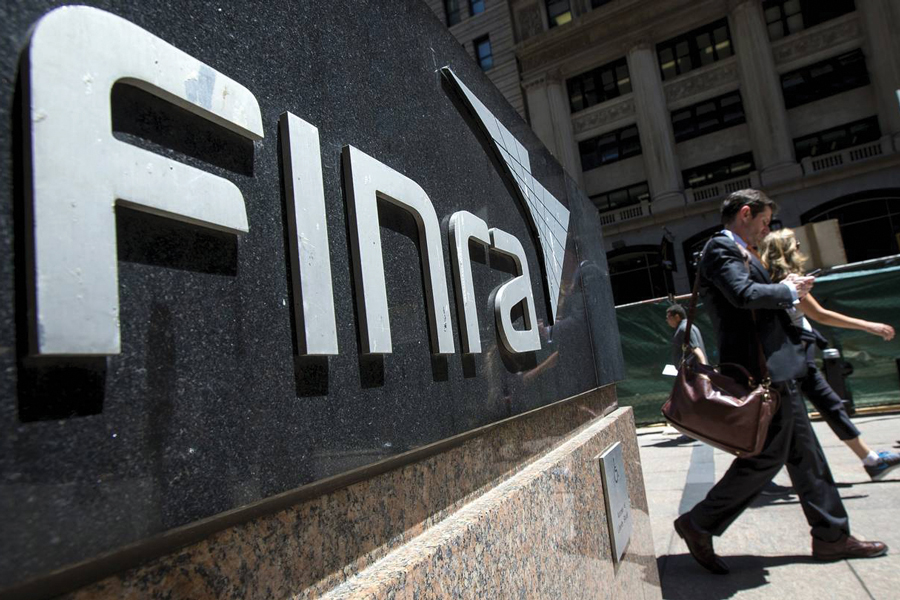

Finra is probing registered representatives who have obtained coronavirus relief loans for possible violations related to work they do outside their brokerage firms.
The Financial Industry Regulatory Authority Inc. is examining reps who took loans through the Paycheck Protection Program and other aid initiatives. The PPP, which was renewed earlier this month as part of a $900 billion legislative package, provides financing for small businesses that have been hit hard by the pandemic.
But Finra is concerned that some reps are receiving federal financial support connected to work they’re doing outside of their brokerage jobs.
“Finra is proactively looking at registered representatives that obtained loans through undisclosed outside business activities,” a Finra spokesperson wrote in an email.
Last fall, Wells Fargo fired 100 employees for abusing coronavirus aid and JPMorgan investigated employees and customers for misusing relief funding.
Finra’s exams are not part of a sweep. They’re targeted at individual reps who have received coronavirus aid.
“Finra’s National Cause and Financial Crimes Detection Program is conducting an examination with respect to your receipt of a PPP Loan,” says a recent exam letter obtained by InvestmentNews. “The purpose of this examination is to determine whether violations of federal securities laws or Finra rules have occurred.”
The letter goes on to request documentation and other information in 13 areas, including questions related to outside business activities in which a rep has participated since 2015 and whether they were disclosed to the rep’s brokerage.
The PPP loan probe is unusual, said Max Schatzow, an attorney at Stark & Stark. A rep for one of his brokerage clients has received a Finra exam letter.
“It seems like it’s outside the typical examination parameters for Finra,” Schatzow said. “None of the requests [in the exam letter] are relevant to investment recommendations or determining whether there have been violations of Finra rules or federal securities laws.”
Brokerages and investment advisory firms that took PPP loans have endured some criticism. Loans through the PPP program, which are forgivable, are meant to bolster small businesses that need help maintaining their payrolls due to the economic cessation caused by the pandemic.
Finra has said that a registered rep who has taken a PPP loan does not need to disclose it on Form U4 if the loan has been forgiven. The Securities and Exchange Commission has said that investment advisory firms should disclose PPP loans if they are primarily used to pay employees who provide advisory services to clients or if the firm would have trouble meeting contractual obligations without the loan.
Brokerages and advice firms that generate revenue based on investment product sales and assets under management presumably are surviving the pandemic thanks to the record-breaking market surge over the last several months.
The fact that the market has bounced back — and then some — from its collapse immediately after the pandemic hit last March may make it more difficult for brokerages to assert that they need a PPP loan to stay afloat.
“It’s a lot harder to make that representation now in good faith than it was nine months ago,” Schatzow said.

Looking to refine your strategy for investing in stocks in the US market? Discover expert insights, key trends, and risk management techniques to maximize your returns

The RIA led by Merrill Lynch veteran John Thiel is helping its advisors take part in the growing trend toward fee-based annuities.

Driven by robust transaction activity amid market turbulence and increased focus on billion-dollar plus targets, Echelon Partners expects another all-time high in 2025.

The looming threat of federal funding cuts to state and local governments has lawmakers weighing a levy that was phased out in 1981.

The fintech firms' new tools and integrations address pain points in overseeing investment lineups, account monitoring, and more.
RIAs face rising regulatory pressure in 2025. Forward-looking firms are responding with embedded technology, not more paperwork.
As inheritances are set to reshape client portfolios and next-gen heirs demand digital-first experiences, firms are retooling their wealth tech stacks and succession models in real time.
